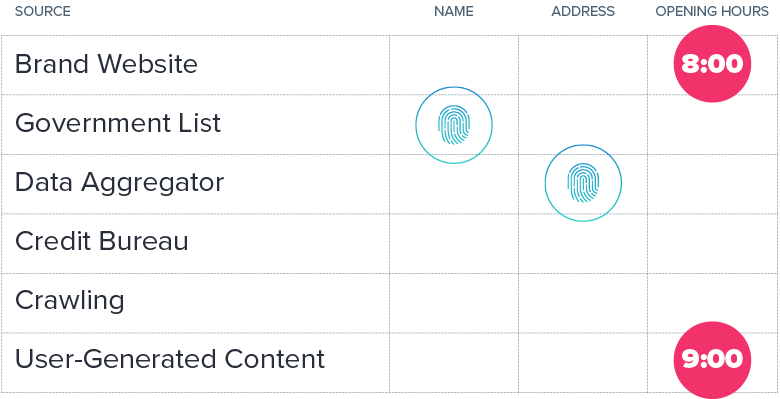Industry Insights
A Better Way: Control, Not Guesswork (Part 4 of 10)
Our mission here at Yext is simple: Put companies in control of their digital knowledge everywhere. We believe companies are the most authoritative source about their own people, products, and locations. While this may seem self-evident, it isn’t. That’s why Yext continues to advocate for the primacy of business-generated digital knowledge with […]

Our mission here at Yext is simple:
Put companies in control of their digital knowledge everywhere.
We believe companies are the most authoritative source about their own people, products, and locations. While this may seem self-evident, it isn't. That's why Yext continues to advocate for the primacy of business-generated digital knowledge with all of the intelligent services with which we work. To understand the ongoing need for this advocacy, let's pull back the curtain on how intelligent services deliver answers to consumers today.
For example, consider a search engine. In its most simple form, it consists of three layers: the User Interface (UI), the Algorithm, and the Knowledge Base.
The UI is simply the way we access the search engine's knowledge. It could be on a desktop website, mobile website, mobile app, in-dash system or digital assistant. We submit our query, and it returns an answer set.
That answer set originates from a proprietary Knowledge Basebuilt upon a custom set of sources curated by the search engine itself. Those sources most often consist of a diverse set of information types including, but not limited to:
- Data aggregators
- Governmental records
- Incorporation documents
- Information from business owners
- Public records
- Publications
- User suggestions
- Websites
These sources will often have duplicative and conflicting information about a business — and that's where the Algorithm springs into action. A search engine's algorithm delivers what it believes is the most accurate answer to the user based on its assessment of each source's authority and reliability. This exercise, however, is always an educated guess and, therefore, can result in the delivery of incorrect information.
Consider the chart below representing some basic digital knowledge about a business. The search engine may source the name from one data source, the phone number from another, and the hours of operation from a third. But what happens when the business says it opens at 8AM while a user and another source suggests it opens at 9AM?

In a world where businesses don't actively manage their digital knowledge and the information they provide is not prioritized, the search engine is left to make a best guess as to which time is correct. Yext changes this dynamic in three ways.
First, as we discussed in Part 1, Bing and many of our PowerListings Network members put "Yext on Top" because of its high quality. This is a reflection that they share our belief that a business is the best source of information about its people, products, and locations. The reputation that Yext has built — and continues to build — with today's intelligent services helps deliver the control that is core to our mission.
Second, we have implemented our patented Match & Lock™ process with many of our publishers. This process ensures that the precise listing for each of our customers' locations is properly matched and then locked to enable customer-only updates. Match & Lock delivers further control over your digital knowledge by protecting your public listings from changes driven by algorithmic assumptions.
Third, with Yext's direct integrations, your updates take priority and go live within seconds or minutes or hours with most of our PowerListings® Network members. Our team is also always working behind the scenes to both add more intelligent services to the PowerListings Network and get our existing integrations as close to real-time as each service permits.
According to Greg Gifford of DealerOn, the overall control Yext provides is is critical in today's ever-changing environment.
 The control offered by Yext over how your digital knowledge appears is yet another reason I believe Yext has found a better way.
The control offered by Yext over how your digital knowledge appears is yet another reason I believe Yext has found a better way.
Check back for Part 5, in which I'll dig into the time savings, accuracy improvements, and competitive advantage offered by Yext's direct integrations with over 100 intelligent services. Want more? Download the full whitepaper, A Better Way with Yext, where I break down how Yext helps businesses of all sizes manage the digital knowledge about their people, places, and products.
